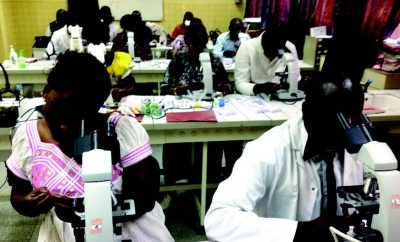Through refresher training support in laboratory diagnosis of malaria that uses a practical hands-on approach to improving malaria microscopy, PMI has enhanced laboratory technicians’ capacity to correctly perform malaria diagnostics.
Improving the quality of malaria diagnosis is a major challenge in the DRC. Through refresher training support in laboratory diagnosis of malaria that uses a practical hands-on approach to improving malaria microscopy, PMI has enhanced laboratory technicians’ capacity to correctly perform malaria diagnostics.
In July 2013, 20 laboratory technicians from Orientale Province from reference laboratories at the province, university, and hospital levels participated in a fiveday malaria microscopy refresher training course, focusing on important skills, such as parasite detection, species identification, and parasite quantification.
Remarkable improvements were noted in the knowledge and skills of the trainees after the course. Basic knowledge on malaria and diagnostic testing procedures more than doubled from an average precourse score of 31 percent to a postcourse average of 65 percent. The average ability to correctly detect parasites on test blood slides rose from 79 percent to 88 percent. The improvement in parasite species identification was even greater, with an increase from 28 percent to 62 percent. There was a fivefold improvement in technicians’ ability to correctly count malaria parasites using the parasite per microliter method (from 11 percent to 55 percent). By the end of the course, seven participants were accredited as “expert level” microscopists by WHO standards; they have been selected to receive further training on diagnostics supervision and will form a core group of “expert supervisors” who will provide continuing onsite supervision to laboratory technicians throughout Orientale Province.

